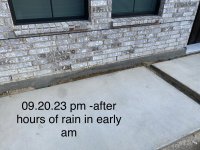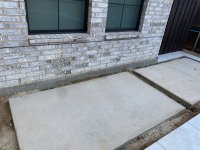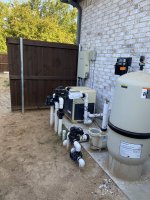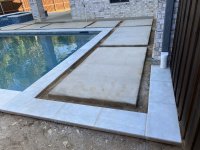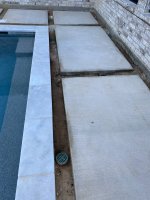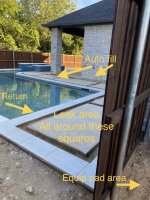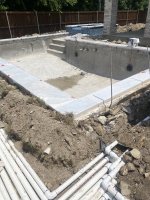- Dec 9, 2022
- 18
- Pool Size
- 10400
- Surface
- Plaster
- Chlorine
- Salt Water Generator
- SWG Type
- Pentair Intellichlor IC-40
Hello,
We just had our gunite 10k gal SWG pool put in and filled mid July. Since then we’ve had water on the ground between the house and the pool around the concrete pads we had the PB put down.
The PB has seemingly done everything in their power to find the leak, but so far they haven’t found anything. I’m at a loss as to where else we could look and what next steps might be. If you have any ideas/theories I’d love to hear them so we can guide the PB a little.
1st attempt to find the leak was bucket test and of course we just have a normal amount of evaporation
2nd attempt was just turning off the overflow to see if it was a leak in that water line, that made no impact either.
3rd attempt the PB had a leak detection company come out, they found no leaks.
4th attempt we had a plumber look at the sewer lines and check to make sure we didn’t have any breaks in the sewer line. We also made sure we don’t have a water line leak (the meter doesn’t move in 8 hours).
5th attempt the PB dug up around the concrete pads to try to find it and determined the lights might be the culprit so we had the lights sealed up (I’m sure that’s the wrong terminology).
After this last step the ground has not gotten dryer, but also hasn’t gotten wetter.
They are sending the leak detection company back out next week, but is there a step I’m missing or some area I should have the leak detection company focus on?
We just had our gunite 10k gal SWG pool put in and filled mid July. Since then we’ve had water on the ground between the house and the pool around the concrete pads we had the PB put down.
The PB has seemingly done everything in their power to find the leak, but so far they haven’t found anything. I’m at a loss as to where else we could look and what next steps might be. If you have any ideas/theories I’d love to hear them so we can guide the PB a little.
1st attempt to find the leak was bucket test and of course we just have a normal amount of evaporation
2nd attempt was just turning off the overflow to see if it was a leak in that water line, that made no impact either.
3rd attempt the PB had a leak detection company come out, they found no leaks.
4th attempt we had a plumber look at the sewer lines and check to make sure we didn’t have any breaks in the sewer line. We also made sure we don’t have a water line leak (the meter doesn’t move in 8 hours).
5th attempt the PB dug up around the concrete pads to try to find it and determined the lights might be the culprit so we had the lights sealed up (I’m sure that’s the wrong terminology).
After this last step the ground has not gotten dryer, but also hasn’t gotten wetter.
They are sending the leak detection company back out next week, but is there a step I’m missing or some area I should have the leak detection company focus on?


